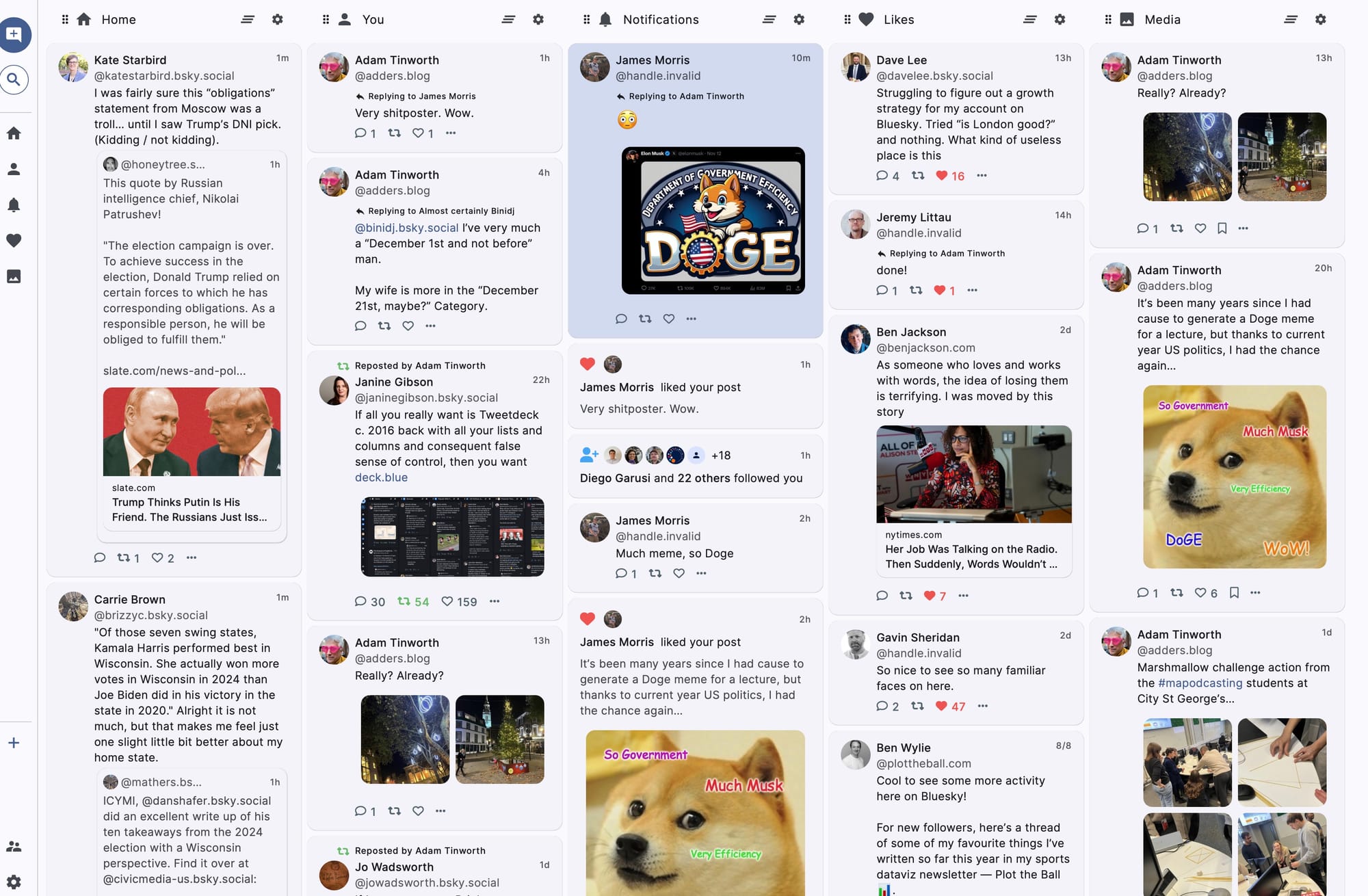Bluesky is having a moment. Time to pay attention.
Musk's close alignment with the new US President-elect has triggered a new exodus from X — with many communities heading for Bluesky. Will this be the tipping point for the new network?

A few weeks ago, Anil Dash wrote an interesting piece called It feels like 2004 again. He argued that, back then, there was a growing frustration with the big, monolithic platforms of the day — AOL, Yahoo, Friendster — and that led to a burst of creativity. That unleashed what we initially called Web 2.0, then social networks, and finally social media.
And now people are in the same place; they’re tired and frustrated with Google and Facebook and their ilk. And new things will be born of that frustration. They will. I’m peripherally involved in a project to tie the ActivityPub standard to publishing that could be really exciting in a few years, for example.
But the current year is also reminiscent of the mid-2000s because, for the first time in a long time, we’re starting to see social media platforms decline. In the 2000s it was MySpace, Bebo and Orkut. Today, it’s Facebook and X (formerlyknownasTwitter).
Twitter degenerated into X
X has been a very different place since it was acquired by Elon Musk. We’ve seen waves of exits, initially to Mastodon, and increasingly to Bluesky and Threads. However, two things have tipped the balance very much in Bluesky’s favour for journalists. The first was that the US election made it really clear that Meta is serious about it not being a platform for news.
As Casey Newton reported on Platformer:
Threads also has come under fire several times over the past year for aggressively removing even the most benign discussions of news. The Washington Post’s Will Oremus said he was “about done with this platform” last week after Threads removed one of his posts linking to a Substack piece analyzing election results. (It was later restored.) “This is the fourth time in a month I’ve been blocked from posting links to journalism for absolutely no defensible reason,” he wrote. “Literally all my post said was ‘some helpful context’ and linked to an essay that compared last night’s election results to recent outcomes in the UK, France and Germany.”
Many journalists have given up on Threads as a result — and that’s made them take Bluesky more seriously as a drop-in replacement for Twitter. And they’re looking for one because of the other thing that’s tipped the balance in favour of Bluesky: Musk’s alliance with Donald Trump.
Musk ❤️ Trump
Musk has been a major backer of Trump in recent months, investing big money in his campaign, and is now reaping the rewards of his loyalty. Not only was he, bizarrely, called into a call between Trump and Ukraine’s President Zelensky, he’s also got a role in the new administration, helping run the new Department of Government Efficiency.
The astute amongst you will have noticed that this is another example of Musk’s shitposter tendencies: the acronym for the new agency is DOGE. Yes, like the meme:

(Admittedly, Musk is more enamoured of the cryptocurrency Dogecoin, but it was named for the meme…)
And that’s led to quite the exodus, as people flee a platform that is now on the edge of becoming, essentially, a government aligned social media tool.
This post is aging like a fine wine.
— Adam Tinworth (@adders.blog) 13 November 2024 at 09:20
[image or embed]
The eXodus to Bluesky
By the 13th November, a week after Trump’s convincing victory, Bluesky had picked up over a million new users:
Social media platform Bluesky has picked up more than 1 million new users since the US election, as users seek to escape misinformation and offensive posts on X. The influx, largely from North America and the UK, has helped Bluesky reach nearly 15 million users worldwide, up from 9 million in September, the company said.
Putting on 6 million users in less than two months, for a platform a couple of years old, is something we need to pay attention to. The more people on a social network, the more likely that it will become a sustainable home for online communities.
At the time of writing, less than 24 hours later, the post-election bump is up to 1.25 million. People are starting to discuss the death of academic Twitter, for example, although it has been noted that this has been predicted before…
This is following a well-established pattern. Platforms die by losing too many communities. Many techies were the first to leave, exiting Twitter for Mastodon, where they can still be found. Now, we’re seeing progressives and general folks on the political left leave, particularly in the anglophone world.
I always thought that journalists and politicians would be the last ones left as Twitter descended into a hellish wasteland of shitposter engagement. But maybe I’m wrong. Journalists are beginning to leave…
The Guardian leaves X
Notably, The Guardian has now exited the platform in an official capacity:
We think that the benefits of being on X are now outweighed by the negatives and that resources could be better used promoting our journalism elsewhere.
This is something we have been considering for a while given the often disturbing content promoted or found on the platform, including far-right conspiracy theories and racism. The US presidential election campaign served only to underline what we have considered for a long time: that X is a toxic media platform and that its owner, Elon Musk, has been able to use its influence to shape political discourse.
This is a big, public moves. And it will trigger people to follow suit. And that’s when the network effect really starts kicking in, on both sides of the equation.
And it's not just the news sites leaving. We've seen everyone from the Clifton Suspension Bridge to Dionne Warwick quit X. And now football teams are following:
St Pauli become first major football club to leave X The German Bundesliga club has moved to Bluesky and urged fans to follow St Pauli was concerned X may influence German election
— Matt Navarra (@mattnavarra.com) 14 November 2024 at 14:55
[image or embed]
So, what do we do?
Any publisher still dependent on Twitter/X now needs a long-term detachment plan from it. Beyond the political issues, X is going through the downside of the network effect — the idea that the value of a social network tends to grow exponentially with the number of users on it. The reverse also holds true: the value of the platform also decreases as people leave. There has been a steady exodus from X, with burst of acceleration around particular events: Brazil, changes to blocking. All sensible audience teams have been reducing their exposure to X for a while and, for all but the most highly political publishers, it was never a great source of traffic anyway.
We should be, at the very least, paying attention to developing a presence on Bluesky and Threads, as they’re on the other end of the network effect, the value of the networks growing as people join: the “Twitter in 2007/8” stage, before the numbers of people reached a critical mass across multiple communities. Meta has tried to hack that by linking Threads with Instagram, but its algorithmic choices for the platforms are proving incompatible with the many people use these microblogging services, hence the engagement issues people are having there. Bluesky is the most direct drop-in replacement for X, which isn’t a surprise, as it was initially a project within Twitter in the Jack Dorsey days to create an open-source version of the platform.
X: Shall I stay or shall I go?
The Guardian may be stopping promoting its work on X — but this isn’t a complete eXit:
Our reporters will also be able to carry on using the site for news-gathering purposes, just as they use other social networks in which we do not officially engage.
That’s the right call, and I’m glad they’re making that explicit. We’re seeing a distinct fragmenting of online communities. The 2010s era of a few main platforms is being replaced by something more like we had in the early 2000s: different communities living in different places online. And that means we need to know both where the people we are reporting for are, and also where the people we are reporting on spend their time. And these may be different places.
Personally, I do very little promotion of my work on X these days because the traffic no longer justifies the time. But I will retain an account there because I need to know how the platform is changing, what communities remain there, and what its current dynamics are. But I won’t be active there, just as I’m not active on the many, many online platforms I retain accounts on for research purposes.
Unless we do this, we’re likely to get even more trapped into self-reinforcing bubbles of like-minded folks. And this time it won’t be the algorithms to blame, but our own decisions.
A Bluesky starter pack
One lovely little innovation from BlueSky is the creation of Starter Packs: groups of people you can follow on a single subject, to immediately populate your feed with interesting discourse.
Here’s a few:
- I’ve created one for my colleagues in the City St George’s journalism department
- There a much bigger one for journalism academics generally
- And here’s one for UK politics journalists and commentators.
And if you’ve really missed Tweetdeck since Musk locked it behind the paywall, then I have good news for you: deck.blue.

It’s very much like the old days of Tweetdeck, currently free.





